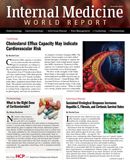Publication
Article
Internal Medicine World Report
Diet Low in FODMAPs Reduces Symptoms of Irritable Bowel Syndrome
Author(s):
Modifying diet is one way to try to help patients with Irritable Bowel Syndrome (IBS). In a study reported in Gastroenterology, an Australian research team looked at the effects of lowering fermentable oligosaccharides, disaccharides, monosaccharides, and polyols (FODMAP) vs. consuming a typical Australian diet.

Modifying diet is one way to try to help patients with Irritable Bowel Syndrome (IBS). In a study reported in Gastroenterology, an Australian research team looked at the effects of lowering fermentable oligosaccharides, disaccharides, monosaccharides, and polyols (FODMAP) vs. consuming a typical Australian diet.
The team found that the patients eating a low FODMAP diet experienced fewer IBS symptoms.
There were 30 IBS patients and 8 healthy individuals in the study group, randomly assigned to consume either a low FODMAP or typical Australian diet for 21 days. The meals were prepared by the team, frozen, prepackaged, and not labeled as to whether they were low-FODMAP. Each group that completed the 21-day diet then went through a 21-day washout period, then crossed over to the other diet.
Their symptoms were assessed both through stool analysis and breath samples — as well as interviews with the investigators.
The diet consisted of 3 main meals and 3 snacks daily. Participants were not calorie-restricted, but were allowed to eat according to their appetites.
“The results of this study provide high-quality evidence that the low FODMAP diet is efficacious for treatment of functional gastrointestinal symptoms in unselected IBS with symptoms being halved compared with a typical Australian diet,” Emma Halmos of Monash University and colleagues wrote in the article.






